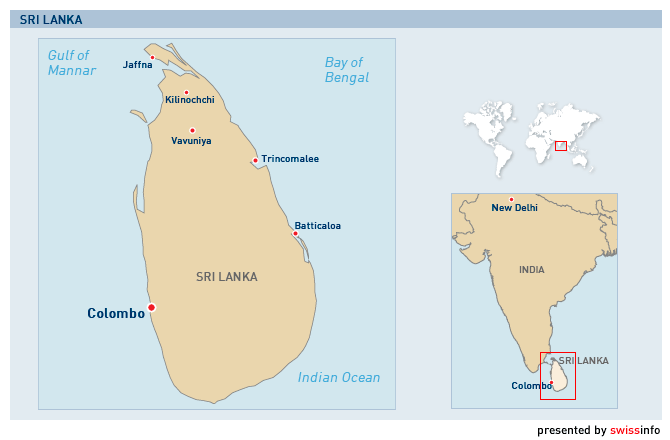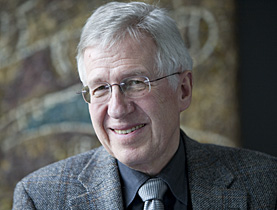Sri Lanka declares victory over Tamil rebels

Over the past three decades, Velupillai Prabhakaran transformed what was little more than a street gang into one of the world's most feared and deadly insurrections.
On Monday, the government of Sri Lanka said it had killed Prabhakaran, crushed his Tamil Tiger rebel group and ended the deadly fight for an independent homeland for the island’s ethnic minority.
Some 70,000 people, including two heads of state, were killed over the course of the conflict.
State television interrupted regular programming to announce Prabhakaran’s death and the government information department sent a text message to mobile phones across the country confirming he was killed along with top deputies, Soosai and Pottu Amman.
The proclamation that the government had decapitated the leadership of the group, known formally as the Liberation Tigers of Tamil Eelam (LTTE), sparked dancing and singing in the capital Colombo and mass celebrations around the country.
On Monday evening, the United Nations said it was consulting with the Sri Lankan government about the humanitarian needs of tens of thousands of displaced people and that UN Secretary-General Ban Ki-moon was considering a visit.
The European Union has called for an independent war crimes investigation. Anton Thalmann, a senior official with the Swiss foreign ministry, at a news conference on Monday characterised the situation for civilians as “deplorable”. The foreign ministry had not released a formal statement by the evening.
“He is our god”
Prabhakaran’s death has been seen as crucial in bringing closure to the war in the Indian Ocean island nation but the approximately 1,500 Tamil expatriates who took to the streets of Geneva on Monday struck tones of defiance and denial.
They believe the conflict is misrepresented in the media and that in general, they are under siege. The LTTE have been banned in North America and Europe and stand accused of crimes ranging from credit card fraud to arms smuggling and sea piracy.
“I don’t believe it,” was how Sellaiah Kanagaraja, a demonstrator in his 40s, reacted to the news. “He is alive. He is our god. I still believe that we can. This is a temporary loss but our leaders are very experienced.”
The chubby, moustachioed Prabhakaran had demanded unwavering loyalty and gave his followers vials of cyanide to wear around their necks to use in the event of capture. The group perfected the use of suicide bombings and were the first to employ women suicide bombers.
The LTTE assassinated even Tamil politicians who disagreed with them and the sense of nationalism, even among second-generation Tamils, is fierce.
In Geneva, the anger was directed as much at the international community as it was at Sri Lanka. Protesters today share the same grievances of the mostly unemployed young men that began the insurgency 30 years ago.
“Killing our children”
“They are killing our families and no one cares what’s happening to our people,” said Santharupan Nirugan, a Tamil living in France. “They are killing children, mothers and fathers and they will grow up with hatred all their lives. People are blind. What does ‘United Nations’ mean?”
Within the tight-knit community, even children are acutely aware of the suffering in their homeland.
“The problems in Sri Lanka are too bad,” said Aarthi Kanagasabai, a young girl from Zurich. “I don’t like to see my family dying in Sri Lanka.”
“I was shocked but I can’t believe Prabhakaran has died,” she added. “All hearts here are beating for him. All of the people here would die for him.”
There have been serious violations of humanitarian law on both sides of the conflict. The UN said 7,000 civilians were killed in the fighting between late January and early May. Health officials in the area said more than a 1,000 others were killed since then.
On Monday, the Geneva-based International Committee of the Red Cross (ICRC) called on Sri Lanka and the remaining LTTE fighters to show restraint.
“Under international humanitarian law, the lives of all those who are not or are no longer fighting must be spared,” said Pierre Krähenbühl, the ICRC’s director of operations.
“This is all the more urgent since no humanitarian aid has reached those who need it for over a week.”
Senior diplomats had appealed for a humanitarian cease-fire in recent weeks to safeguard the tens of thousands of civilians trapped in the war zone but the government refused and denied persistent reports it was shelling the densely populated war zone.
Diplomats in Brussels said on Monday that the European Union would a call for an independent war-crimes investigation into the killing of civilians in Sri Lanka.
In 1987, Sri Lanka passed an amendment to the country’s constitution, providing greater autonomy to local authorities. The country’s national government had always promised it would offer the Tamils a political solution but only after a military victory.
swissinfo.ch with agencies
The Tigers started fighting in the 1970s for a separate state for Tamils in Sri Lanka’s north and east. They argued that successive majority Sinhalese governments had discriminated against the Tamils.
The conflict has killed an estimated 70,000 people, displaced thousands more and held back the island’s growth and economic development. The UN says 6,432 civilians were killed and 13,946 wounded in the three months from the end of January 2009.
The Tigers pulled out of talks in 2003 and again in 2006, claiming they were being sidelined, and between then and 2008 both sides accused each other of numerous breaches of the ceasefire as the country slid inexorably towards all out war.
Having announced the capture of Mullaitivu, the last of the Tamil Tigers’ northeastern strongholds, in February the Sri Lankan army said it was very close to defeating the rebels.
With a series of victories in recent months, the Sri Lankan military says it has boxed the insurgents into a small strip of northern coast, with water on both sides, measuring 2.5 square km.
Both the military and the Tigers have been regularly accused of gross abuses of human rights by organisations such as Amnesty International and Human Rights Watch.
The military says around 200,000 civilians have fled the rebel-controlled zone this year. Those Tamils who left are in refugee camps, which aid agencies say have got better but still need millions of dollars to run.
Sri Lankans are one of the biggest migrant groups in Switzerland.
There are 42,000 people of Sri Lankan origin in the country. Between 90 and 95 per cent of them are Tamils.
Since 1973 more than 11,000 Sri Lankans have acquired Swiss citizenship. One third of the Sri Lankans with permanent residence or Swiss citizenship were born in Switzerland.
The Tamils in Switzerland live mainly in the German-speaking areas, in particular cantons Bern, Zurich and Basel.


In compliance with the JTI standards
More: SWI swissinfo.ch certified by the Journalism Trust Initiative











You can find an overview of ongoing debates with our journalists here . Please join us!
If you want to start a conversation about a topic raised in this article or want to report factual errors, email us at english@swissinfo.ch.